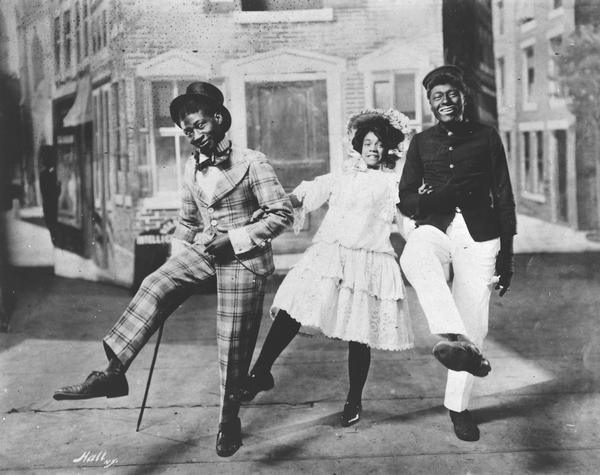
After the introduction of Folk Negro Spirituals in the late 18th century, there soon became a rise of black entertainment known as Jubilee. Jubilee is defined as “the special celebration of events” or in the context of the Bible, “the sounding of a trumpet.” In this transitional period (1880-1929), black people began to form and congregate in their own churches to create an atmosphere of Christianity that ultimately helped upkeep their spirituality. During the early 19th century, America had just started working towards changing its political constraints against black people. With the abolition of slavery by the 13th amendment, this social implication changed the way black people could operate in America. Although still not 100% free, black people had always been in control of creating their own forms of art and entertainment.
What usually was performed in community based settings, all the way up to being used in cake-walks and minstrels, or black-face, grew to be something bigger than one could imagine. Most importantly, the characteristics of Jubilee are described as having a rhythmic tempo and soulful, jazzy sound, which is why it became the precursor for Jubilee and Gospel Music. The rise of Jubilee Quartets, a group of four male vocalists—sometimes female, started on some of the greatest Historically Black College campuses. The Fisk Jubilee Singers, were a group of vocalists that traveled and fundraised for their college. Each Quartet consists of a Bass singer, who sings the lowest and tempo-based vocal arrangement in a four-part harmony. The baritone, usually the lead singer, sings the melody. Following is the tenor, who usually sings the higher harmony that also mimics an instrument, followed by the soprano who sings another part of the harmony in their falsetto voice. The singers built their reputation by dressing in formal attire which became a large factor in the way their music was accepted on a larger scale. They could perform in many white settings as longs as they looked the part. With this new “privilege” black people could express their struggles with a little more sophistication and precision.

During this period, most of the singers that formed these groups were young men ranging from ages 18 to 24. Some of the most astounding performers were The Mills Brothers who sang upbeat songs that became popularized during The Great Depression (1929-1939), their songs contradicted the time period they lived in, which is a factor of their popularity. The most successful and prominent group that formed the sound of Jubilee was the Golden Gate Quartet, founded by Willie Johnson. They began creating an art form that consisted of a rhythmic beat and lively lyrics. Along with war, the creation of radio and the microphone were some of the highlights of this era. This contributed to the commodification of Jubilee music. As radio became a prominent way of communication in the United States, it also became a way for quartets to become commercialized. As time went on the sound of Jubilee began to change into a dynamic music form known as Gospel, the singing of the “Good News” or “Word of God” that lead to the use of multiple voices, usually sextets or more.
Jubilee Quartets can be viewed as the forefather of pop music as we know it today. In reality these groups formed as a way to express the spirituality of black people and grew to be an art form that would impact the way black people were viewed in America. The social dynamics in the United States were beginning to be struck like the sounding of a drum and there was nothing that could change what was already started. Black Music was here to stay.

